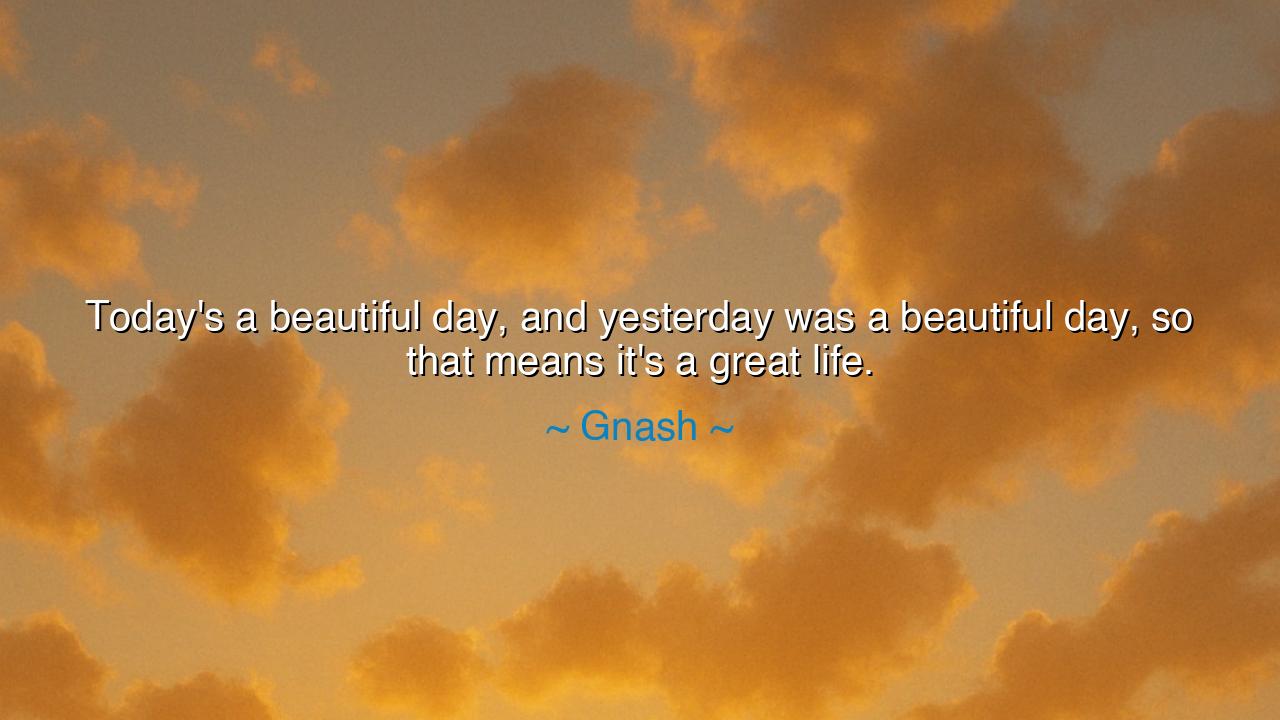
Today's a beautiful day, and yesterday was a beautiful day, so
Today's a beautiful day, and yesterday was a beautiful day, so that means it's a great life.






In the gentle simplicity of truth, Gnash once said: “Today’s a beautiful day, and yesterday was a beautiful day, so that means it’s a great life.” At first, these words seem light, almost casual — the musings of a soul content in the moment. Yet within them lies a wisdom as old as the mountains, as deep as the sea. For he speaks of the rare art of contentment, the ability to see beauty not in the extraordinary, but in the ordinary unfolding of days. In a world that forever seeks more, this quote stands as a quiet rebellion — a hymn of gratitude for the present moment, and a reminder that a great life is not made of grand events, but of small joys well noticed.
To call today beautiful, and to call yesterday beautiful, is to dwell in the realm of mindfulness — that sacred state known to the ancients as the harmony of the soul. The philosopher Epictetus once taught that happiness does not depend on what happens to us, but on how we perceive it. Gnash, in his youthful wisdom, echoes the same eternal law: that beauty is not bestowed by fortune, but chosen by the heart. When one can look upon two consecutive days — ordinary, fleeting — and see in them the wonder of existence, then one has indeed found the essence of a great life.
Such a vision is not born from ignorance of pain or struggle. It comes, rather, from awakening — the recognition that even amid sorrow, the world still holds its quiet miracles. Consider the story of Anne Frank, who in the darkest of times, wrote in her diary, “I don’t think of all the misery, but of the beauty that still remains.” Hers was a life of confinement, of fear, of loss — yet she still found beauty in a sunbeam, in the turning of the seasons, in the unbroken power of hope. Like Gnash, she understood that life’s greatness is not measured by ease, but by the courage to see light in the shadows.
In every age, the wise have taught that gratitude transforms perception. The Buddha called it the root of joy. The Stoics called it the foundation of peace. The poets called it love. Gnash’s quote, simple as morning sunlight, carries that same eternal spirit: when we awaken each day and say, “This is beautiful,” we weave the threads of joy into the fabric of our days. And when we look back and say, “Yesterday was beautiful too,” we discover the alchemy of happiness — the power to transform fleeting moments into lasting meaning.
This truth reveals a profound secret: that greatness in life is not about abundance, but about awareness. The person who finds joy in simple days will never be poor, for their wealth is inward. The kings and conquerors of history, who possessed whole empires yet found no peace within, stand in contrast to the humble soul who watches the sunrise and feels complete. The ancients called this ataraxia — serenity born of wisdom. For the one who can find beauty in both the dawn and the dusk, in both the laughter and the quiet, holds within them the kingdom of contentment.
Let us then learn from these words. Each morning, before rushing into the noise of the world, pause and see — truly see — the light filtering through your window, the sound of the wind, the pulse of your own heart. These are not small things. They are miracles disguised as routine. Each evening, before surrendering to sleep, remember something from the day that was beautiful — a word, a smile, a taste, a scent — and give thanks. In doing so, you train your soul to see the divine in the daily, and your life will become, as Gnash said, not just a collection of days, but a great life.
The lesson is clear and timeless: gratitude is the path to greatness. Those who see beauty in today and yesterday have already triumphed over despair. They have learned the secret that eludes the restless — that happiness is not something to chase, but something to recognize. So live as the wise of every age have lived: look around, breathe deeply, and call the day beautiful. For if today and yesterday are so, then tomorrow, too, shall surely shine — and your life, in its quiet fullness, will be nothing less than a song of gratitude to existence itself.






AAdministratorAdministrator
Welcome, honored guests. Please leave a comment, we will respond soon